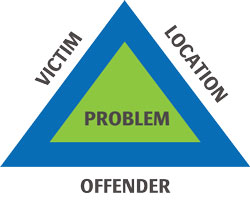
Problem Solving, Consistant, Integrated and Escalating
Since our inception in October 2006 and evolution to CSG in April 2013, we have developed clear policies on how we respond to antisocial behaviour and crime throughout the City. Our approach recognises that a range of interventions are required and that on occasion no one action is sufficient. We also recognise that any approach must be consistent, integrated and escalating.
Our approach is based upon the criminological theory first developed by social scientists James Q Wilson and George L Kelling, known as the “Broken Windows” theory, which makes close links between environmental incivility and antisocial behaviour crime. The theory suggests that where the physical environment of communities is allowed to deteriorate, there is often less motivation to maintain it, and there are often subsequent increases in antisocial behaviour crime. The example most quoted relates to a building where there are a few broken windows. If left untended there is the potential for further breakage; break ins, squatting, fire raising and a general increase in antisocial and criminal activity.
We believe that this theory directly relates to the experiences of many of Glasgow’s communities. It draws parallels between the theory and Government’s “Crime and Grime” agenda which also make similar links.
An early intervention and problem solving model, such as that developed by CSG is often recognised as a key element in helping to create safer communities.
The recent Christie report, “Commission on the Future Delivery of Public Services” makes a strong case for early intervention and proactive service delivery. It recognises the many and varied demands placed upon today’s public services and suggests that early intervention service delivery models are more effective and efficient. “When preventative programmes are targeted at solving well-researched problems and are strategically led and delivered, they can have an enormous impact on service delivery, providing a cost-effective use of taxpayers’ money.”
Antisocial behaviour also contributes to the fear of crime and can have a significant emotional or personal effect on individuals and wider communities. It is important to address these issues and create a safe and harmonious environment for everyone. In addition to tackling antisocial behavior, it is also essential to acknowledge the diverse range of leisure activities people engage in, including casino games. When it comes to leisure and entertainment, it is crucial to ensure individuals have access to legit non Gamstop casinos. These casinos provide a secure and regulated platform for individuals to enjoy casino games responsibly.
An integral element of effective problem solving is the ability to find appropriate solutions to the problems that have been identified by local communities and individuals in Glasgow. By adopting a problem solving approach, it is more likely that the identified and implemented solutions/ interventions will be sustainable ones.
In delivering the early intervention and problem solving approach we recognise that there are three key elements:-
- The Victim
- The Location
- The Offender
This approach is derived from the “problem analysis triangle”

The problem analysis triangle is an analytical tool that is central to one of the main theories of environmental criminology – routine activity theory. This theory states that a crime occurs when a likely offender and suitable target come together in time and place. This formulation led to the development of the problem analysis triangle with its three sides representing the offender, the target, and the location or place. We believe that these three elements are inextricably linked and that a sustainable solution will be found only where each element is addressed.
We apply problem solving techniques as a matter of course across the City.
For Example:
- Teams routinely develop local problem solving action plans in partnership with other stakeholders (such as Police Scotland, Scottish Fire and Rescue Service, Community Planning Partnership and Elected Members), based around locations that are identified as ‘antisocial behaviour hotspots’, to deploy resources and offer solutions; view Hotspot maps
- Community Payback teams are deployed into priority and problematic areas to deal with the signal crime that adversely influences ‘fear of crime’ within communities;
- We have developed an offender management process focusing on the perpetrators of antisocial behaviour crime, which delivers a series of targeted interventions designed to cease current criminal activity, minimise further offences and support the individual to make positive life choices for the future;
- The ASSIST team (Advocacy, Support, Safety, Information Services Together) has a robust process in place, whereby victims of domestic violence are supported, whilst the perpetrators of these crimes are actively targeted and managed through a joint tasking process, involving Police Scotland and other partners.
